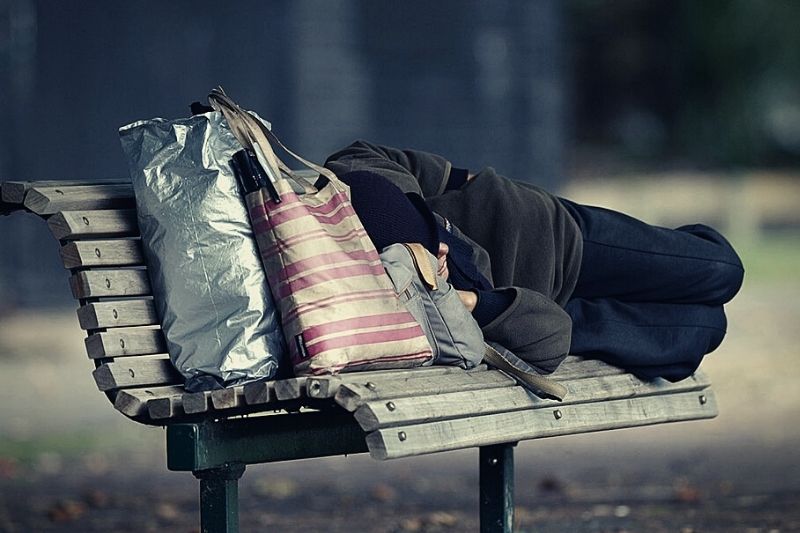For most of us, Homelessness Week is an exercise of the imagination. It invites relatively secure people to explore the experience of the homeless poor. Executives and professional people take part in sleep ins in halls, both experiencing what it is like to sleep rough for a night and to live without customary comforts.

This year, however, homelessness is not a condition of people unlike us, but threatens many friends with a life experience similar to our own and to that of our children. The cost of buying a house, of paying a mortgage and of renting a flat has risen sharply. It often exceeds people’s income. This is due partly to inflation and rising interest rates, partly to the limited stock of accommodation and the excess of demand over supply. As a result more people have become homeless. On the eve of Homelessness Week, a Homelessness Services report estimated that the demand made on them for accommodation had increased to 1,600 each month. Two thirds of those affected were women and children. Anecdotal evidence also includes stories of elderly people evicted from rental housing because they cannot meet rising costs, white collar workers sleeping in cars when moving to another city for work, and a homeless woman released from jail pleading successfully to be returned there.
Statistics and passing experience, however, do not catch the harsh, destructive reality of homelessness. To be homeless is to live with constant anxiety for your safety and for the security of the possessions that link you to your history and affections. It is to move constantly searching for shelter. It is for children constantly to change schools to the detriment of making friends and learning. It brings the extra cost of buying less nutritious food in the absence of a stove, exposure to heat and cold and vulnerability to physical and mental illness. It is to have to plan how to shower and wash your clothes. It entails the loss of a community of which you are part and a postal address to which government agencies can send mail. To be homeless is to live a shadow life. It is to be made unsocial and to see your human spirit being eroded.
A colder judgment of homelessness is to say that all human beings have the right to shelter, and that in a modern and wealthy society the State has the duty to provide that shelter for those who otherwise cannot find it. A decent society will demand of its governments that they make this gesture of solidarity with people who are disadvantaged. The present level of homelessness in many developed nations is intolerable and highlights the indecency of past neglect.
The cause of this neglect has long been evident. It lies in an economic ideology that has emphasised the need of individuals to cope for themselves, the right of individuals to seek and amass wealth without restriction, and the opportunity of governments to cut costs on social services and to farm them out to private enterprise for profit. Instead of expanding programs of public housing, governments sold off its stock to developers of private housing. At the same time their taxation policies enabled those with wealth to buy houses as investments, with the result that houses were no longer seen as shelter but as wealth that would grow as need grew. In Australia, as in other nations, the need did grow. And with it grew the massive inequality in wealth between those with houses and those without sure accommodation.
'Those of us who live securely in our homes and shelter should look in the eye the people who sit homeless in our city streets and acknowledge that their condition is the dark side of our privilege.'
The COVID epidemic and the vast increase in government debt required to meet the economic and personal effects of lockdowns have increased the need for investment in temporary and permanent accommodation, made it difficult for builders to secure the material and financial resources need to meet their commitments, and have limited the capacity of governments to fund the large programs needed. These shortfalls have increased the price of houses and of rentals and exacerbated the inequality that is the underlying cause of the problem.
Governments have lacked the courage to address inequality by increasing the tax on wealth. To be fair, they have also had to consider the unintended consequences of bold policies designed to remedy past neglect at a time when more and more demands are made of them. Their inactivity, however, leaves us with prolonged homelessness as a human blight, as a social scandal, and as an indictment ofGovernments and their advisers for subscribing to a destructive economic ideology, and of us as a people for electing Governments of all political colours that neglected the common good in pandering to individual choice and to corporate stripping of the commons.
The existence and extent of homelessness call on us as persons and as a society that we make it a priority to offer accommodation to those who lack it. It also requires us to recognise as our brothers and sisters people who are homeless. Those of us who live securely in our homes and shelter should look in the eye the people who sit homeless in our city streets and acknowledge that their condition is the dark side of our privilege.
Andrew Hamilton is consulting editor of Eureka Street, and writer at Jesuit Social Services.
Main image: Homeless person sleeping on a park bench. (Dean Purcell / Getty Images)